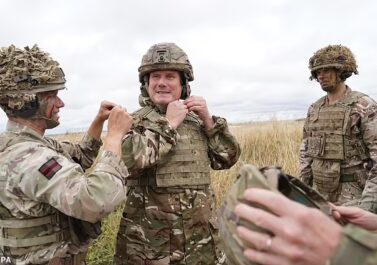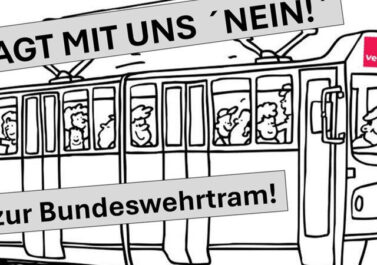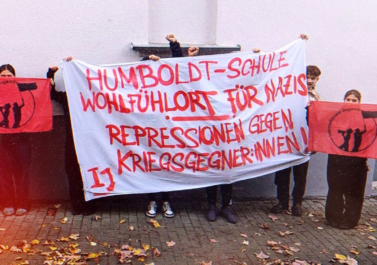The below is a slightly re-worked version of a presentation made by a comrade at a meeting we held in February to discuss the Ukraine war and the debate within the collective. In it, the comrade attempted to present core principles of what they consider the ‘Revolutionary Defeatist’ position. This could just as easily be branded ‘proletarian internationalism’ or something similar. This was one of a couple such presentations, one of which has already been published on our website as an individual contribution. Though there are still disagreements over specifics, we did agree to publish five positions that were unanimously or majority held views.
The following is less of a coherent article of the type that we usually publish, but an individual contribution to what we hold to be a crucial topic; how should communists respond to war? Though the specifics of a situation are contingent upon comrades’ proximity to the conflict, the comrade argues that there are lines that should not be crossed as a matter of principle rooted in the history of the movement towards a communist society.
We reproduce this on the site now in the interest of transparency, as we would encourage all comrades and collectives to reflect on their disagreements and varying perspectives.
In February, Angry Workers met in Sheffield to reflect on the war in Ukraine and our responses. At that meeting we were able to agree the following positions either unanimously, or as a majority –
1. Oppose all governments in their effort of militarisation and war; support and emphasise the need for global class struggle against this system in crisis – Unanimous
2. Clearly distance ourselves from the arguments of ‘left’ groups in favour of weapons supply and defence of nation states – A minority abstained on weapons supply as a matter of principle, for them this would depend on the specific arguments and context.
3. Support workers who refuse to produce for or supply the war, offering a critique of any declared preference for ‘the opposing side’, for example, a purportedly ‘anti-imperialist’ support for Russia – A minority abstained from supporting this as a matter of principle, since again it would depend on contextual specifics.
4. Get actively involved in practical solidarity but with a separation from a trajectory towards supporting any state apparatus – Unanimous
5. Make a specific effort to build ties to groups of workers and militants in Russia and Ukraine, for example, by supporting comrades to learn Russian or Ukrainian and visit the region – Unanimous
Slogan of Makhno’s revolutionary Black Army
==========================================================================
“I for one will speak against war so long as my voice will last, now and during war. A thousand times rather would I die calling to the people to refuse to be obedient, to refuse military service, to refuse to murder their brothers, than I should ever give my voice in justification of war, except the one war of all the peoples against their despots and exploiters – the Social Revolution”. – Emma Goldman
During the meeting a presentation was made aimed at exploring two questions:
What is Revolutionary Defeatism (RD)? Is it still relevant?
The comrade making the presentation opened with an apology if parts of it were ‘ABC’ for the meeting. We extend that comment to readers of this report, but would repeat from the presentation that going back to basics and trying to grasp a historic thread is necessary if we are to even consider the case for RD.
Prior to the presentation a short reading list was circulated, which is included below this report. The list was headed with the quote from Emma Goldman, reproduced above, and included six texts. As mentioned in the presentation, these were not texts that were selected as the most complete or detailed expositions of Revolutionary Defeatism, but were chosen to illustrate the living thread of a proletarian revolutionary response to war during “the imperialist epoch”.
==========================================================================
Presentation and Speaker’s Notes
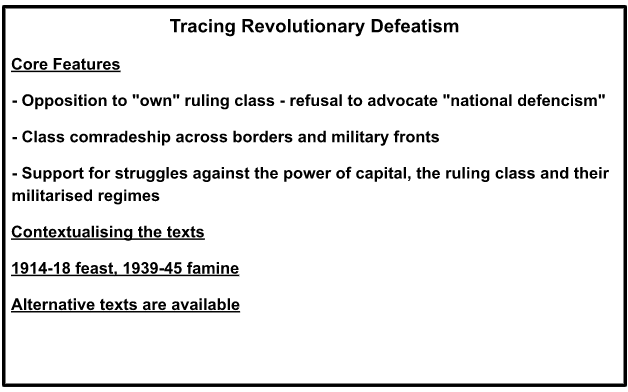
RD is a response by supporters of the social revolution whose legacy can be traced at least since the start of the First World War. A crystal clear example of the position was provided by a Serbian comrade reflecting on the very first actions in the Third Balkan War, which would soon become the Great War/First World War. That quote is reproduced in the Kon-Flikt article in the Reading list and was also referred to on our site on June 3rd.
The three features listed on the slide are probably not ‘the final word’, but begin to summarise the approach that is central to all the responses in the RD strand – certainly all those on the reading list as well as many other available texts. That thumbnail sketch of three interconnected positions should resonate with our basic understanding of class struggle.
The texts are from three different time periods. This is not accidental because we are dealing with a consistently internationalist pro-social revolution approach, which, I will argue, is still relevant and a guide to action. Where comrades do not accept that, then hopefully after today we will have a better view of what unites or divides us and how we can move forward as the current wars continue and will deepen or spread.
The slide mentions the vast quantity of surviving material that shows what our predecessors were doing during the first imperialist slaughter.
The period from 1917-21 was the period when RD bore its fruit – actions by the working class ended WWI. There was short-lived control by republics based (at least in name) on Workers Councils in Russia, Hungary, and Bavaria. Critically, there was a failed revolution in Germany, but generalised class struggle challenged the power of capital across the globe. Our class organised mass strikes, mutinies, generalised actions such as the Winnipeg mutiny and, notably in the case of the Italian two red years, a wave of factory occupations.
Quoting a previous internal discussion:
Today we are in a situation that is massively different than in the First World War where the “imprints” of an Internationalist and revolutionary understanding were still present in significant strata of the class despite the betrayal by the Second International. That is the background to why Luxemburg , Liebknecht and the Zimmerwald left did not remain propagandist voices in the wilderness but their “word became flesh” during the wave of class combat that ended the First World War and saw the biggest struggle, to date, for a proletarian revolutionary reconstitution.
That situation of a “revolutionary” memory in a significant part of the class does not exist today. In fact it had largely disappeared by 1939 where the left’s response to the war, conditioned by 20 years of material defeats and ideological confusion, was a combination of Stalinist-manipulated “Peace Frontism” coupled with support for Stalinist land grabs (39-41), followed by wholehearted support for workers to enter the slaughter house as part of the Allies’ war effort.
During the last fifty years there has been a fragile re-emergence of a minority of communist forces committed to anti-state solutions, centred on working-class self-emancipation. They have breathed new life into RD, but our position as a minority is reflected by our very limited traction within a class who remain actively or passively in favour of the war machines created by their local ruling classes.
So, yes we have current RDist texts from other organisations working in the UK that support social revolution for example ACG and the left communist organisations. Globally, there are many other examples. We signed the founding declaration and have maintained involvement with PAAW (Permanent Assembly Against War), an enterprise that has enabled a degree of collaboration around positions that refuse support to any national projects and are committed to self-organised social struggles.
Comrades can of course spend more time going through other material. Around the First World War, Luxemburg’s Junius pamphlet or reports from the Conferences at Zimmerwald and Kienthal would be good next steps.
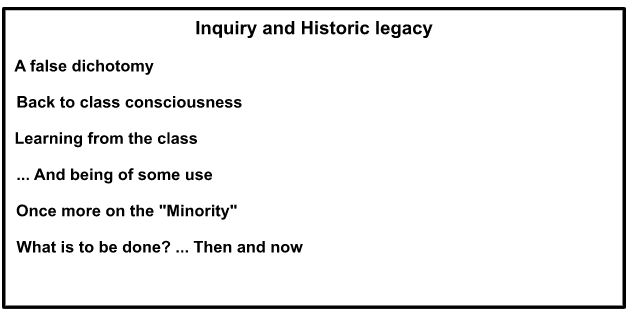
What is the relationship between inquiry and analysis and the distilled lessons from the previous history of class struggle?
By carrying out enough interviews and studying enough data around a particular circumstance can we arrive at a praxis that runs contrary to the ‘best practice’ from generations of advocates for social revolution?
By interviewing workers in a country that is at war, is it valid for us, for example, to argue that attempts to organise against their local national bourgeoisie should be abandoned in favour of taking up arms as auxiliaries of the national armed forces?
I, and upholders of the RD legacy would argue “no” to both. We recognise that at this stage of the war in Ukraine, the majority of workers in Russia appear to be in favour of, or sulkily neutral about, the bloody attempts to restore ‘Russian greatness’. Of course there are notable exceptions such as the street demonstrations and the many thousands of young men who crossed into Georgia to avoid conscription. The weight of support amongst workers for the Ukrainian military efforts unsurprisingly seems much higher amongst workers in the post-2014 Ukraine borders.
Are we afraid to stand against the stream, or are we ‘majoritarians’ without a political framework?
Again, to pro-majoritarians we definitely need to say, “no”. It is not arrogant or dismissive to say that the minority that consistently argues for working class unity, struggles against all bourgeois abominations and towards workers’ self liberation are often politically out of step with most of the class. Only in our imaginings is it otherwise.
When we inquire and analyse we do it to better understand the life of the class and to better involve ourselves. The intention must not be to adapt to views and practices that run counter to the interests of the class as a whole.
Again, we return to the hows and whys of a pro-revolutionary minority.
We are not about bringing consciousness to the class, the self organised and subsequent reflection is the source of the further development of consciousness and combativity.
In this present case, we should be about explaining clearly the class interests behind national wars and the class interests in the struggle against them.
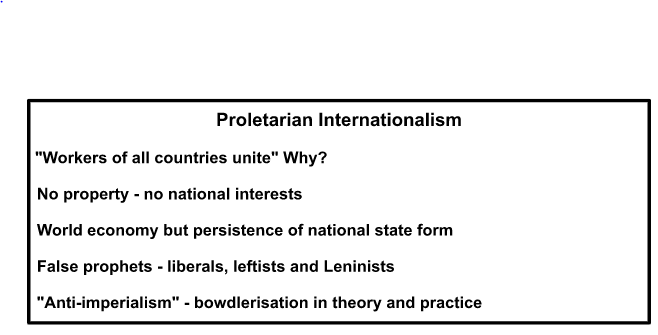
The final appeal in the ‘Communist Manifesto’ is for workers of all countries to unite. Written at a time when industrial capitalism only prevailed in pockets of Europe the appeal reveals the deepest understanding of the essence of the proletariat within capitalism.
National state boundaries provided the structures in which the bourgeoisie could develop their economic and political control. Within those fortress walls the rule of bourgeois (i.e. exploitative) property was sacrosanct, squeezing out other classes, both exploiters and exploited and developing the panoply of national institutions to protect their social order. Workers, on the other hand, have no property, meaning the factories or workplaces that are the crucial bases for production, accumulation and exploitation. This is the meaning of the old adage that the working class comprises “women and men of no property”.
The bourgeoisie’s use of the national state has continued despite the fact that huge transnational conglomerates dwarf many states and the states themselves, in turn, are enmeshed in numerous treaties, alliances, international organisations and co-operation agreements.
In the 21st century, and we will come back to this, workers have no objective interest in defending or creating national entities. Once we are dragged behind forces aiming at retaining control by one national bourgeois state or handing territory to another blood sucking clique, workers inevitably lose sight of their real and objective class interest. Instead, “the prevailing ideas being those of the ruling class” is demonstrated in spades as demagogues of both left and right wing varieties compete to dragoon workers behind national flags, existing or aspirational.
And it’s here that we find the peddlers of confusion jostling for power.
The liberals and radicals will support this or that oppressed nation ignoring the exploitation exercised by the class of capital that oppresses and exploits the working class in every part of the world. The various leftists (Social Democrats and the 57 varieties of ‘official Leninists’) will act even more perniciously. Jostling for their place in any revised state order, they paint a left-wing veneer onto the projects for new states.
That leftist support for one or other bourgeois state is often labelled as anti-imperialism. We will move onto the necessity of destroying imperialism. It certainly has nothing in common with switching territorial control from one wing of the bourgeoisie to another.
The awful nonsense that arises from such practice was seen in the ex-Yugoslavia where one bunch of left-wing anti-imperialists supported Milosevic’s Serbian state (“Hey, he’s being bombed by NATO”) while others supported the opposing Kosovan separatists (“Hey, that’s about national liberation”). Currently the same crass, leftist rhetoric is used to justify workers, in or out of uniform, being slaughtered in Ukraine – one gang of leftists support Putin’s anti-imperialism because he’s supposedly taking on NATO and EU expansion supported by the “great Satan” USA. Others support the Ukrainian war effort because, naturally, they are the real anti-imperialists standing against the Russian expansionists.
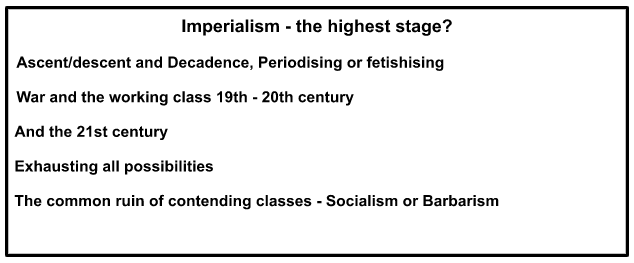
So what are the global developments that are the backdrop to RD being the defiant response?
Here we are indebted to the generations who stood firm and evaluated the decades that followed the defeat of the revolutionary wave in the early 1920s (Appel, Mattick Snr., Socialisme ou Barbarie, Cardan/Castoriades, Munis, Johnson/Forest Tendency, Situationists etc.)
As early as the end of the 19th century, German pro-revolutionary Social Democrats had postulated that humanity was faced with “socialism or barbarism”. By the second decade of the twentieth century revolutionary writers such as Luxemburg, Bukharin and Lenin had all analysed the dynamics by which capitalist social relations were spreading to dominate every part of the world.
The First World War and its revolutionary aftermath evidenced the fact that the new sphere of capitalist competition, harnessing the industrial developments of mature capitalism at the service of militarised states, would bring in horrors if not replaced by a new social order. And so the remainder of history has shown.
During Marx and Engels’ lifetime it was possible to see a progressive essence in the military achievements of national bourgeoisies destroying the old order. The unifications of Germany and Italy provided new national state boundaries for capital to develop the productive forces. Likewise the US Civil War, despite a forestaste of the horrors of industrialised warfare, firmly established the predominance of capitalist property relations over a slave-based economy – all as a prelude to bloodily destroying the non-capitalist systems of the First Nations.
In line with other class societies it is possible to see an ascending and a descending phase.
By somewhere around the start of the 20th century, industrial capitalism was poised to impose its exploitative and ultimately destructive domination in every part of the world.
The RDers in the 1910s anticipated an epoch of wars and revolutions. Unfortunately for humanity the proletarian revolution has failed to mature.
For the last 30 years, since the collapse of one of the two dominant competing capitalist state powers, the unresolved class antagonism has resulted in a spiral of ecological destruction, mass hardship, forced migrations, wars without end. It is now apparent that the “gates of hell” have indeed been opened with both Europe and the Pacific being areas where nuclear warfare could break out.
Perhaps it is not too dogmatic to postulate that we are living in a period where, in the absence of ‘a revolutionary reconstitution of society’, we are experiencing the appalling symptoms of “the common ruin of the contending classes”.
It is axiomatic, if needing further exploration, that societies do not end until they have exhausted all possibilities. It is probably a matter for future historians freed from the horrors of class society, to debate whether global capitalism became decadent around the start of the 20th or 21st century.
What we need to be clear about is that the proletariat, the vast majority class, can gain nothing meaningful or permanent while capitalism staggers forward. Only steps towards a revolutionary reconstitution carried out by a working class increasingly “for itself” is the real alternative.
To imagine that the working class can seek strategic accommodations with a blood soaked and putrescent system is naive in the extreme. Human beings continue “to make their own history but not in conditions of their own choosing” … but advocates of social revolution are not passive observers.
A rejection of the approach embedded RD in favour of ‘recognising agency’ to support one or other national war only leaves us advocating passive acceptance of the drive by capital into a cataclysmic cul- de-sac.
During the First World War
Leaflet by Karl Liebknecht in WWI
Trotsky’s Preface to ‘War and the International’
During the Second World War
Manifesto of the Communist Left to the Proletarians of Europe, June 1944
On Ukraine from current comrades
Manifesto against the war by Sergio Bologna, Rüdiger Hachtmann, Erik Merks, Karl Heinz Roth, Bernd Schrader

